9 Best ECommerce Mobile App Builders (2025)
Looking for the right mobile app builder for your eCommerce store? Let's explore the best options in 2025, each suited to different budgets, goals, and platforms.
Author:
Max Hatter
Publish date:
5th September 2025
10 min read
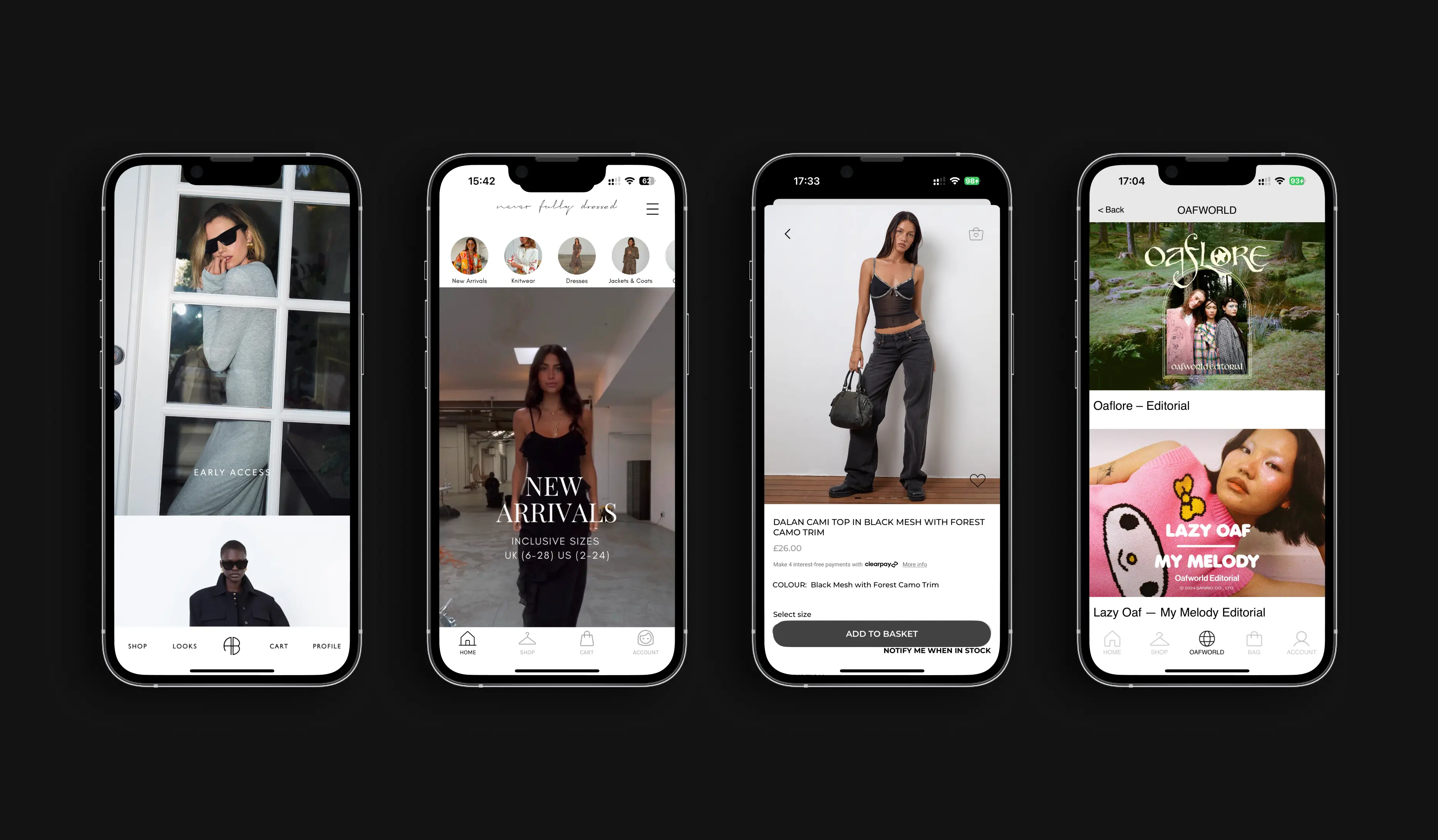
Brief Article Overview
- Mobile apps are one of the best ways for eCommerce brands to retain customers and drive sustainable growth
- No-code app builders have made mobile apps far more accessible and cost-effective.
- Core requirements to assess include internationalisation, integrations with tech stack & development approach.
- Venn Apps is the best overall choice for Shopify brands, combining bespoke design with scalability and white-glove support.
- Mowico is well-suited for non-Shopify merchants, while Bubble is ideal for marketplace-style apps.
- The right solution depends on your brand’s platform, growth stage, and ambitions.
Introduction
Mobile commerce is growing faster than ever, with shoppers spending more time - and money - inside mobile apps than on mobile websites.
For ambitious eCommerce brands, launching an app has become a priority. It’s a powerful way to build loyalty, increase repeat purchases, and support long-term growth.
The good news is that creating an app in 2025 is easier than ever. You no longer need to hire an agency or build an in-house dev team. No-code platforms and dedicated mobile app builders have made the process far more accessible.
The challenge is choosing the right partner. With dozens of eCommerce mobile app builders available, the options can feel overwhelming. Some are geared towards fast DIY launches, others are designed for tighter budgets, and a handful cater specifically to premium brands that need advanced design and scalability.
This guide cuts through the noise. Drawing on 7+ years of experience building apps for hundreds of eCommerce brands, we review the 8 best eCommerce mobile app builders in 2025, each matched to a different use case and budget.
Why build a mobile app for your eCommerce store?
A mobile app is one of the best ways for eCommerce brands to strengthen customer loyalty, cut back on expensive remarketing, and give shoppers a smoother, more enjoyable mobile experience.
With ad costs climbing (CPMs have doubled over the last five years), it’s never been more important to focus on retention and find cost-effective ways to bring customers back. A branded app helps you do exactly that.
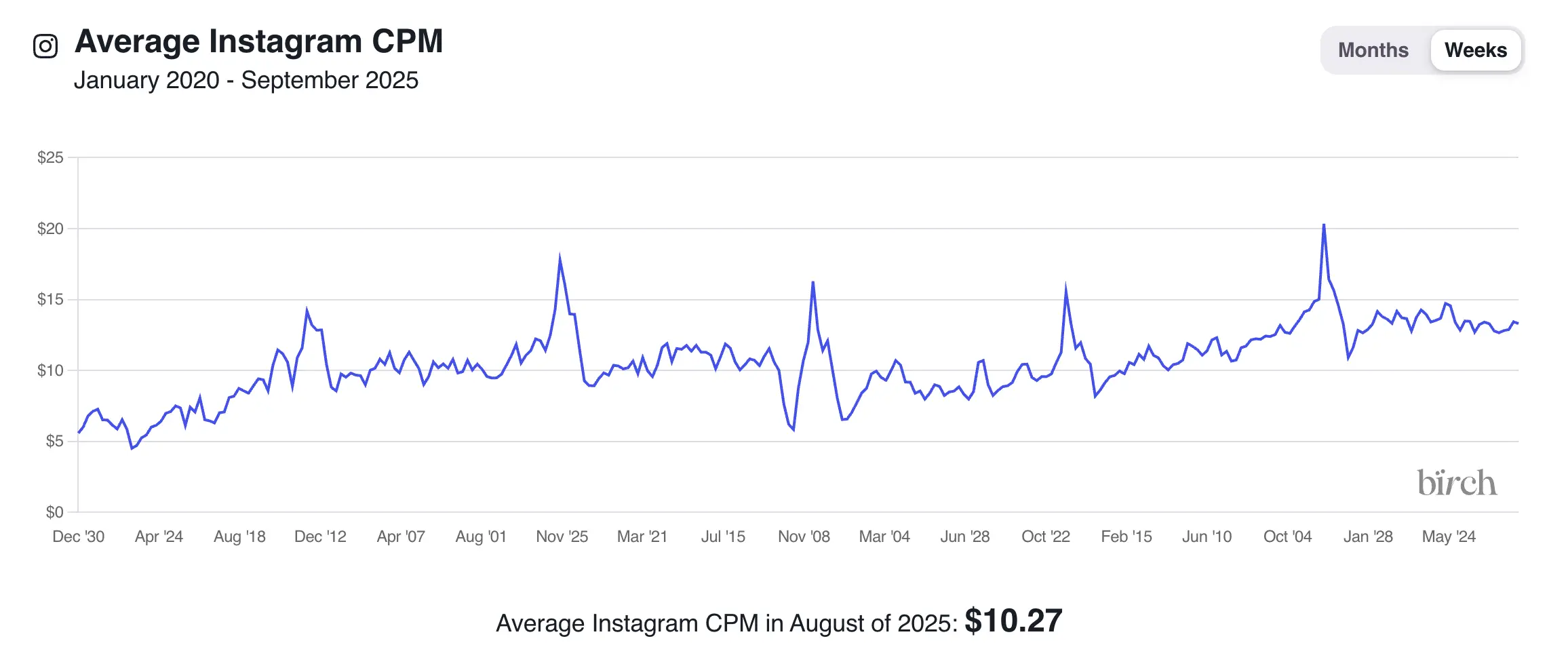
Here’s what an app can unlock:
- Owned reach: Push notifications put your message directly on the homescreen.
- Stronger loyalty: Apps give your most engaged customers a dedicated place to shop again and again.
- Better shopping experience: Faster, smoother, and designed for mobile screens — which leads to higher conversions.
- Less reliance on ads and email: Reduces dependence on SMS, Meta, and email to re-engage customers.
- Higher average order value: Personalised, app-only experiences encourage more browsing and bigger baskets.
How to choose the right eCommerce Mobile App Builder?
Not all mobile app builders are created equal. The right choice depends on your brand’s size, market, and ambitions. From our experience working with different eCommerce brands of all sizes, here are the main factors to consider before committing to a platform:
1. Design Continuity
Your app should feel like a natural extension of your website, not a stripped-down version. Some builders only offer templated layouts, which can limit how much of your store’s design and functionality carry across.
For design-led brands, look for a provider that offers design and feature parity with your website.

2. Integrations with Your Tech Stack
Every eCommerce brand relies on a mix of tools — loyalty programmes, reviews apps, subscriptions, personalisation engines. The best mobile app builders integrate with these systems to maintain a consistent experience across channels.

Before choosing a platform, check whether your key integrations are supported natively or if workarounds will be needed.
3. Scalability & Internationalisation
If you’re selling internationally, multi-language and multi-currency support isn’t optional.
Some app builders only support this partially, leaving international customers with gaps in their shopping experience. This can seriously harm conversions - so if you sell globally, it’s essential to choose a platform that can support proper app localisation.
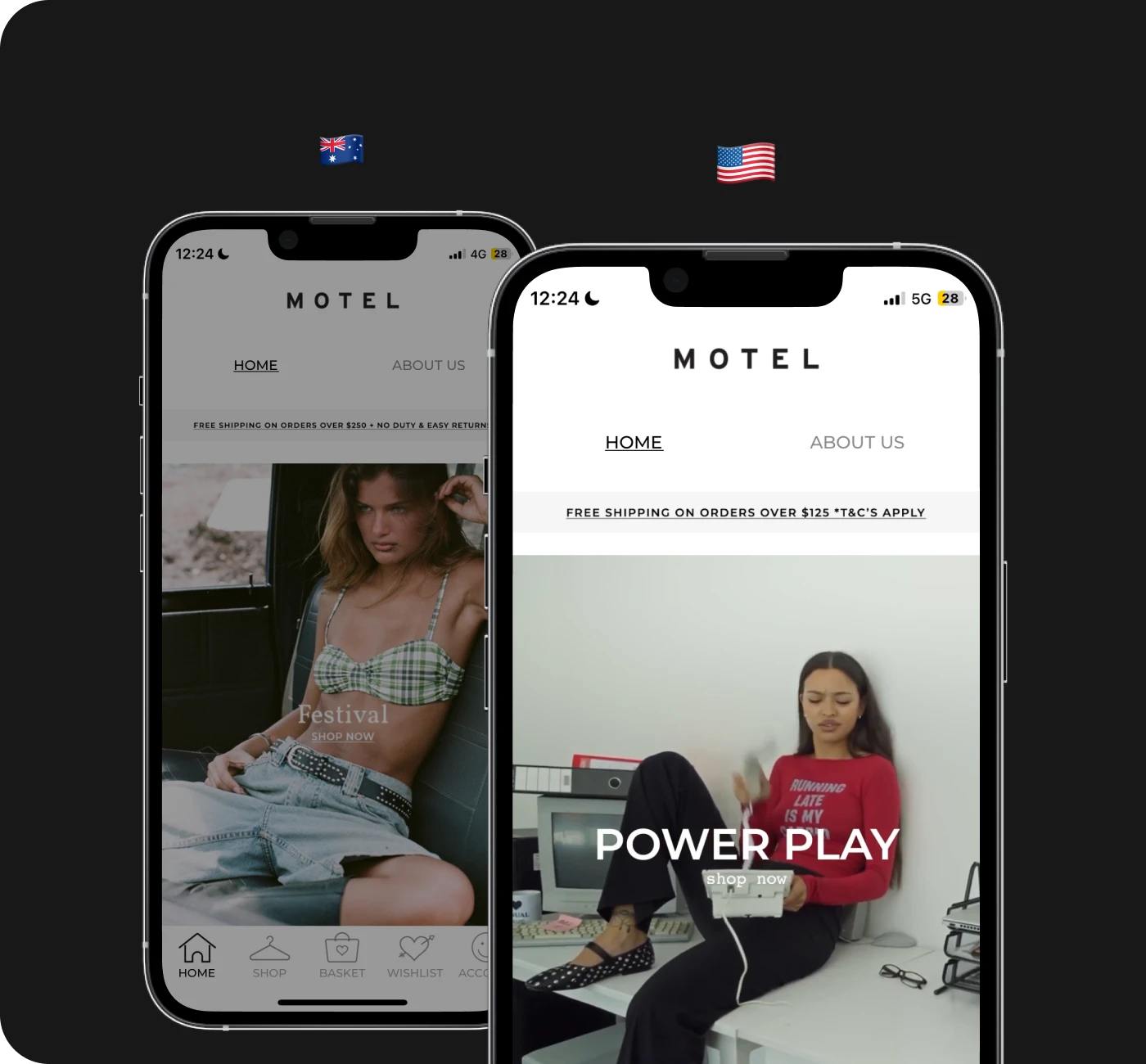
💡 For instance, When Pink Gellac migrated to Venn Apps for a properly localised mobile app, they saw a 96% lift in through-app revenue. This highlights the importance of choosing a platform that fully supports multi-language & currency.
4. Pricing Model
Mobile app builders typically follow two models:
- Fixed monthly pricing (predictable costs, easier to budget).
- Revenue-based success fees (percentage of app sales).
While revenue-based pricing might seem light-touch at first, fees grow as your order volume increases, which can eat into margins. If you’re planning for long-term scale, fixed pricing usually provides better predictability and avoids penalising growth.
5. Platform Expertise
It’s worth considering whether the provider specialises in your eCommerce platform. For example, some builders are Shopify-first, meaning their integrations, features, and support are tailored to Shopify merchants. Others are platform-agnostic, covering WooCommerce, BigCommerce, or custom builds.
If you’re on Shopify, a specialist platform usually means a smoother, deeper integration with your existing tech stack.
6. Native vs Wrapper
Not all apps are built the same way. Some platforms create native apps, designed specifically for iOS and Android, which give a smoother, faster user experience. Others use a wrapper approach, which essentially repackages your mobile site inside an app shell.
While wrappers can be quicker and cheaper to deploy, they often lack performance and flexibility. Brands aiming for loyalty and repeat purchases will usually see better results from native apps.
7. Support & Ongoing Strategy
Launching the app is only the start. Keeping it updated, optimised, and engaging requires ongoing work. Some providers are DIY-focused, leaving most of the responsibility with your team.
Others, like Venn Apps, offer a white-glove service with design, launch, and post-launch support included. Consider how much internal resources you can realistically dedicate to running your app day-to-day.
8. Time to Launch
Timelines vary widely. Some platforms can publish an app in just a few days using pre-built templates, while bespoke builds may take several weeks. Match the provider’s timeline to your business needs to ensure an on-time delivery.
Best eCommerce Mobile App Builders in 2025

1. Venn Apps – Best for global Shopify Plus brands

Venn Apps is designed for premium Shopify merchants that want a fully bespoke mobile experience. Unlike template-driven builders, Venn creates apps that mirror the design, features, and UX of your site, ensuring continuity across web and mobile.
With over seven years of experience and hundreds of apps launched, the team brings deep expertise in scaling international brands.
Just some of the brand Venn Apps work with include: Represent, Motel Rocks, TOTEME, & AYBL.
Pros:
- Bespoke design handled by an in-house team of Shopify specialists
- Full parity with Shopify (metafields, bundles, custom checkout flows)
- Native support for multi-language and multi-currency
- Unlimited integrations (Klaviyo, LoyaltyLion, Recharge, Yotpo, etc.)
- Fixed monthly pricing with no success fees
- White-glove onboarding and post-launch growth support
Cons:
- Higher entry price compared to DIY builders
Pricing:
From £1,500/month. Includes design, development, integrations, and ongoing support.
Verdict:
Venn Apps is the best option for Shopify Plus brands that want a premium, design-driven app that scales internationally without adding pressure to internal teams.
➡ Get in touch with Venn Apps today to start building your mobile app!
2. Shopney – Best for budget-conscious merchants
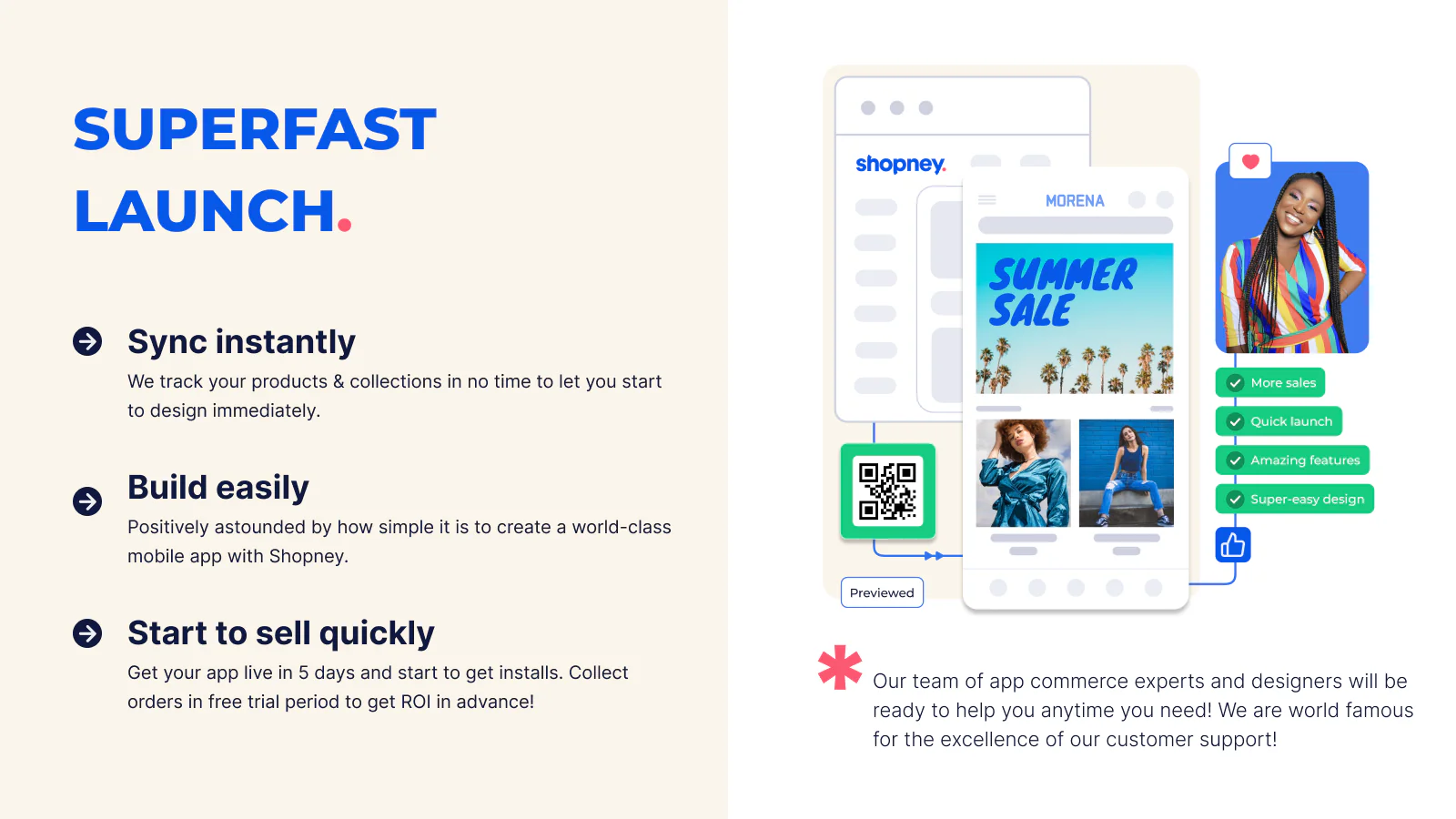
Shopney focuses on affordability and simplicity. It’s a good way for smaller brands to dip their toes into mobile commerce without heavy investment.
Pros:
- Affordable entry price
- Multi-currency support
- Push notifications and loyalty integrations
- Quick go-live (often within days)
Cons:
- Design flexibility is limited
- More basic than higher-tier solutions
- Not ideal for complex brand experiences
Pricing:
From $99/month. Pro plan at $199/month adds integrations.
Verdict:
A smart choice for smaller Shopify stores that want to test the impact of a mobile app before scaling up.
3. MageNative – Best for fast app launches

MageNative is built for speed. Using pre-designed themes, merchants can publish an app quickly with minimal setup.
Pros:
- Very fast to launch
- Simple backend with minimal learning curve
- Push notifications and cart recovery included
Cons:
- Pre-designed themes limit creative freedom
- Less flexible for long-term scaling
- User experience not as polished as bespoke apps
Pricing:
From $49/month. Mid-tier plans $99–$149/month.
Verdict:
Best for brands that need an app live quickly — but not the right fit for design-led retailers.
4. Vajro – Best for live video & interactive commerce

Vajro combines affordability with unique engagement features, most notably live video shopping. This makes it appealing for brands that want to create more interactive mobile experiences.
Pros:
- Built-in live shopping and real-time engagement
- Wide integration support for marketing and rewards tools
- Automation flows for push notifications and in-app messaging
Cons:
- Template-based design feels generic
- Limited advanced customisation for larger brands
- Focused more on features than polish
Pricing:
Starter at $99/month, Growth at $249/month, Plus at $399/month.
Verdict:
Vajro is a great fit for brands experimenting with live commerce and automation, but not the best choice for luxury or design-focused experiences.
5. Tapcart – Best for Shopify stores that want DIY control

Tapcart is one of the best-known names in Shopify app building. Its no-code editor makes it simple to create an app in-house, with strong analytics and loyalty integrations.
Pros:
- Easy drag-and-drop editor
- Supports push notifications and loyalty tools
- Good analytics and reporting
- Can extend with Custom Blocks if you have React Native developers
Cons:
- Templated design limits customisation
- Internationalisation support is patchy
- Success fees on revenue can become costly
- Complex features often require developer input
Pricing:
Starts at $200/month. Can scale to $1,000+ for larger stores, plus success fees.
Verdict:
A solid DIY option for mid-sized Shopify brands that want control and quick launch, but less suited to global or design-heavy retailers.
6. POQ – Best for enterprise retailers on Salesforce
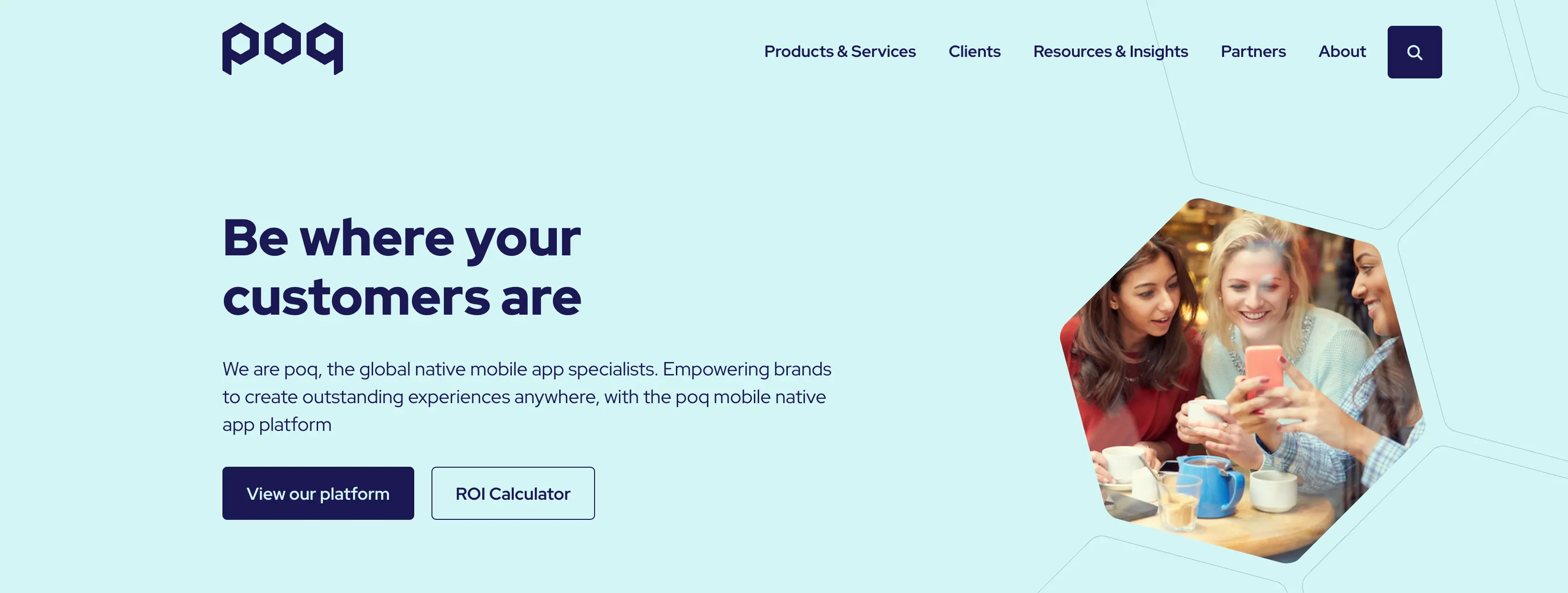
POQ is best suited for enterprise retailers on Salesforce that want control over features, integrations, and compliance.
Pros:
- Tailored architecture for complex needs
- Custom integrations with ERP, payments, and fulfilment
- Suitable for regulated industries or enterprise compliance
Cons:
- Very high cost
- Requires strong in-house tech resources
- Long implementation timelines
Pricing:
Typically £100,000+ annually.
Verdict:
A strong option for enterprises that want to own their app IP and have the team to manage it. Overkill for 99% of Shopify merchants.
7. Appy Pie – Best for quickly testing an app
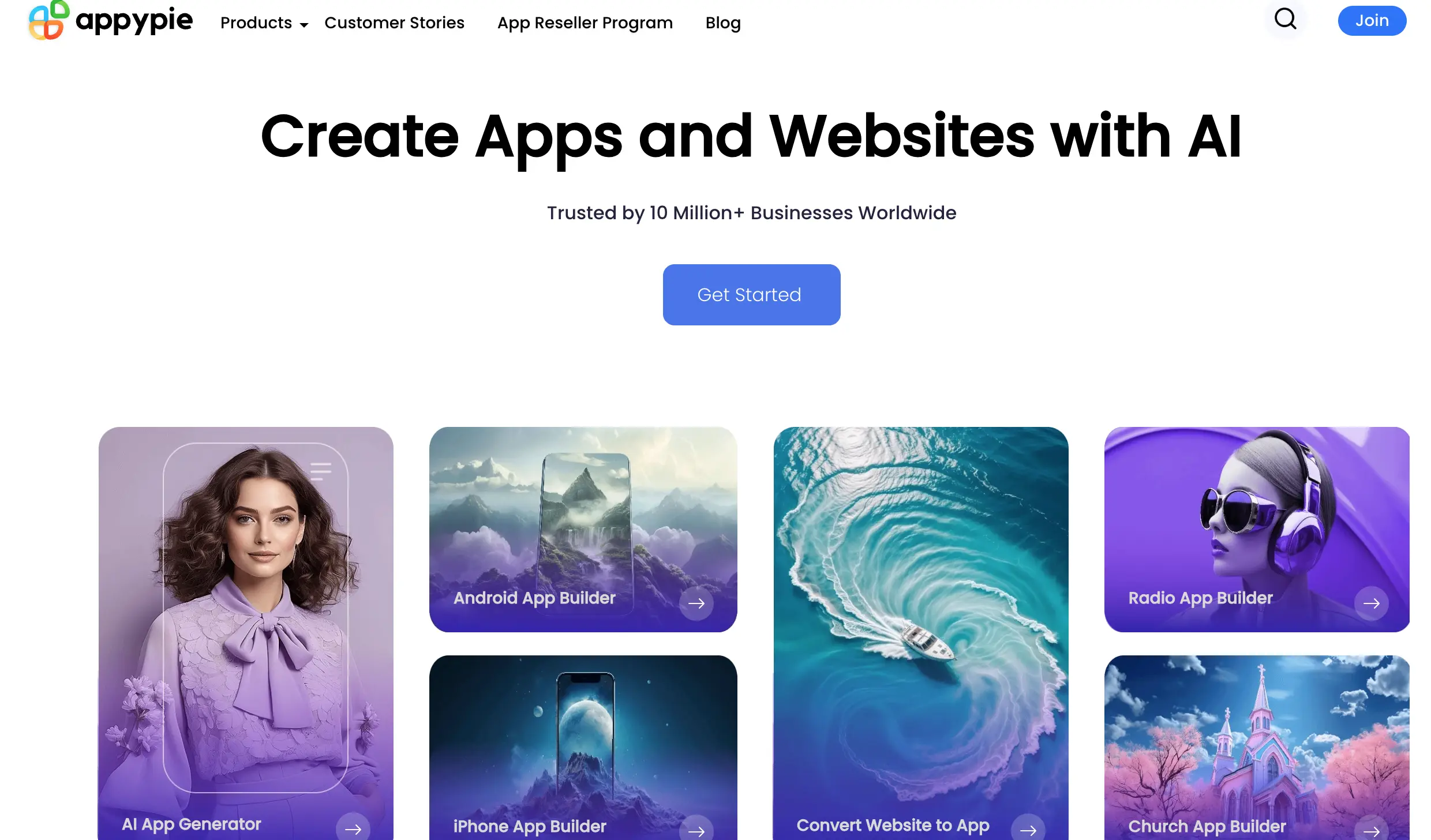
Appy Pie is a general-purpose no-code app builder that allows merchants to create simple mobile apps with minimal effort. While it isn’t built specifically for eCommerce, it’s often used by smaller brands that want to test out having an app before committing to a more advanced platform.
Pros:
- Simple drag-and-drop builder
- Quick to launch with minimal setup
- Supports basic push notifications
Cons:
- Not eCommerce-first (limited Shopify features and integrations)
- Very basic design options
- Limited scalability for growing brands
Pricing:
From $16/month. Advanced tiers add more features.
Verdict:
A lightweight option for brands that want to test an app quickly and cheaply, but not suitable as a long-term solution for serious eCommerce growth.
8. Mowico – Best for Platform-Agnostic Build
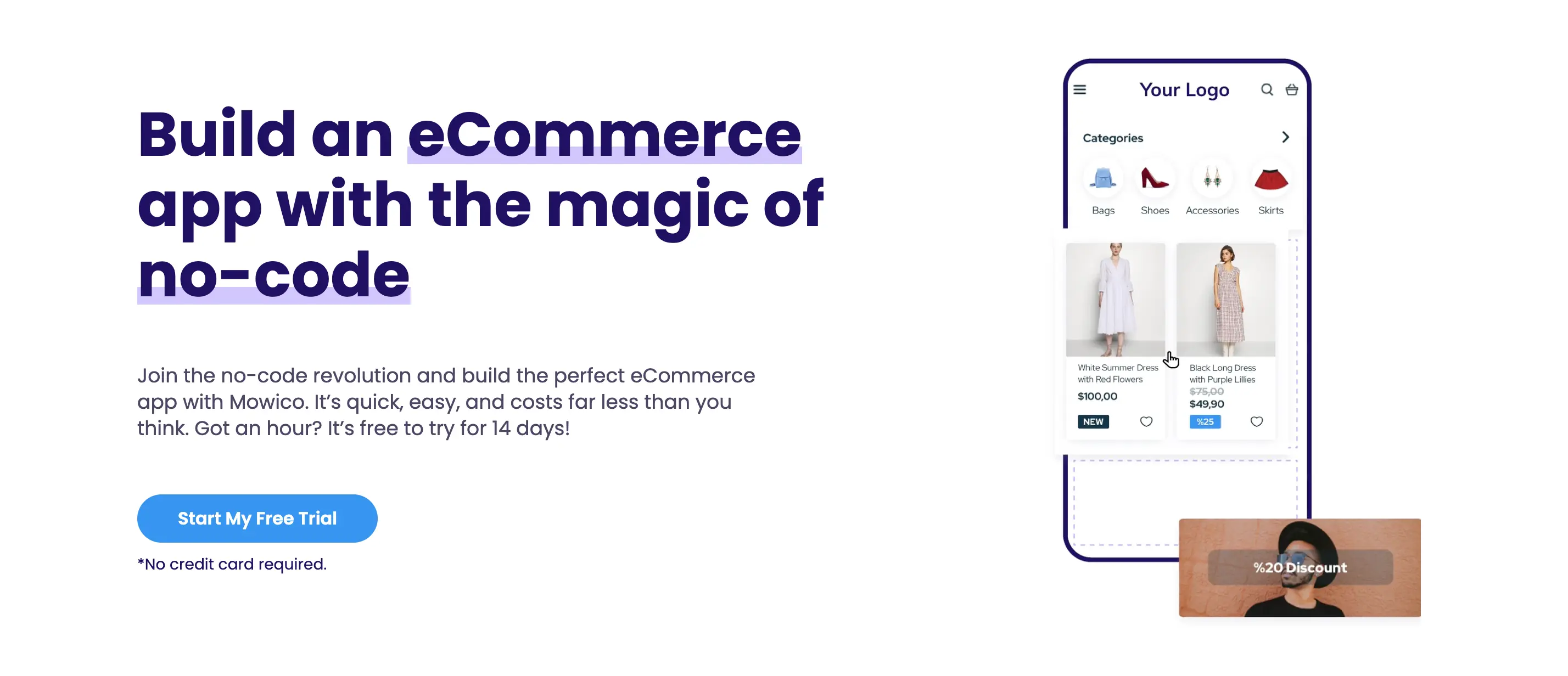
Mowico offers both no-code building and a web-wrapper approach, making it flexible for brands that aren’t exclusively on Shopify or that run headless commerce setups.
Pros:
- Works across multiple platforms (Shopify, WooCommerce, BigCommerce)
- Can wrap an existing mobile site into an app
- Flexible integration support
- Fast to deploy
Cons:
- Wrapper apps don’t match the performance of native builds
- Fewer advanced engagement features
- Not ideal for high-growth or design-focused retailers
Pricing:
From $99/month.
Verdict:
Mowico is best for non-Shopify or headless brands that value flexibility and speed over native performance.
9. Bubble – Best for eCommerce marketplace apps
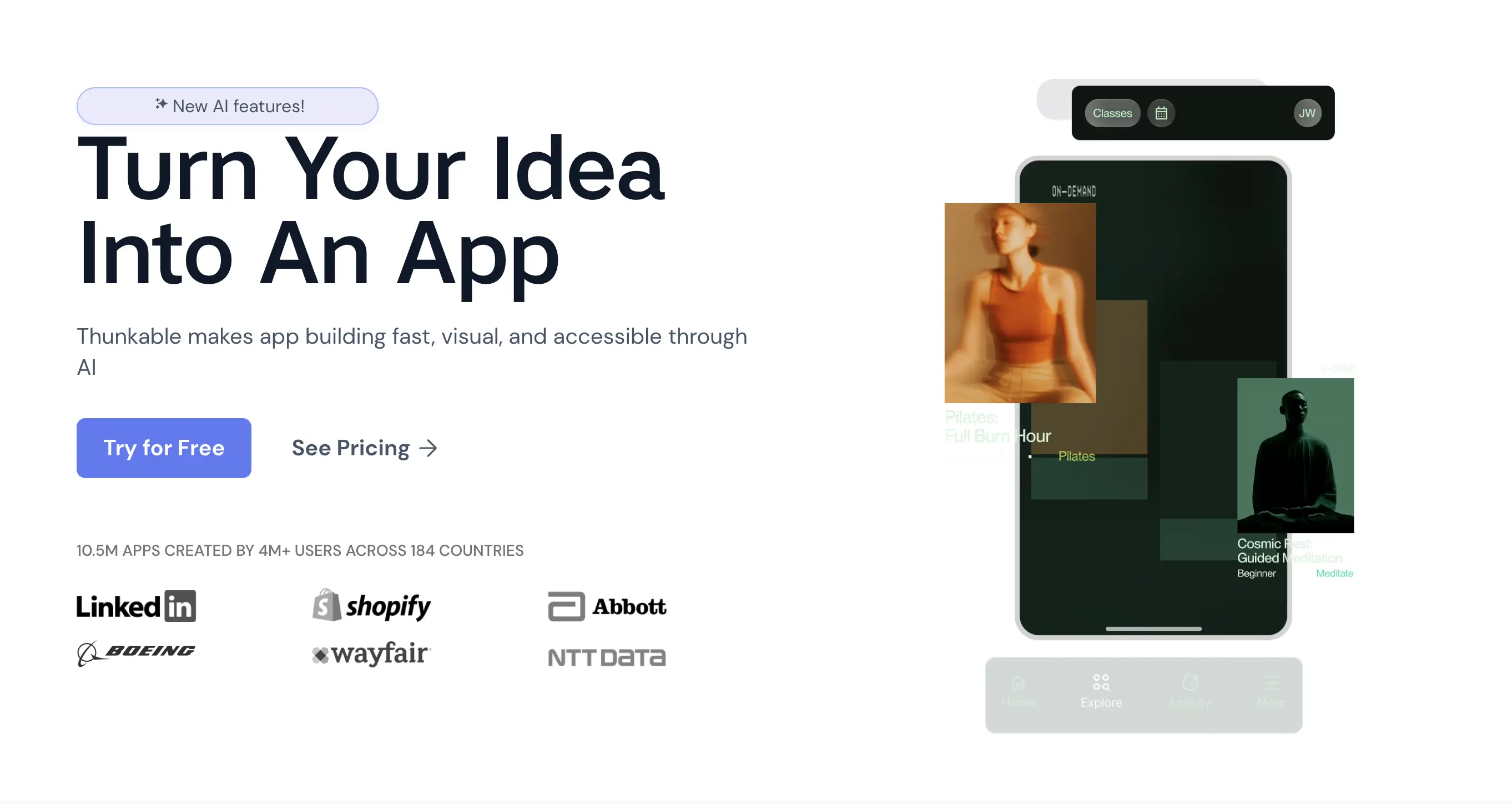
Bubble is a no-code platform designed for building custom applications from scratch. It’s not built specifically for eCommerce stores, and it isn’t suited to brands that just want to turn an existing shop into an app. Instead, it works best for marketplace-style apps or businesses that need multi-vendor setups and unique workflows.
Pros:
- Flexible enough to support marketplace and multi-vendor apps
- Large plugin ecosystem for payments, reviews, and logistic
- No-code builder with a high degree of design freedom
Cons:
- Not tailored for single-store retailers
- Steeper learning curve than plug-and-play app builders
- Takes longer to get live compared to template-based tools
Pricing:
Free to start, paid plans from $32/month.
Verdict:
Bubble is best for entrepreneurs and businesses building marketplace apps or more complex eCommerce platforms. It’s not the right fit if your goal is simply turning an online store into an app.
Summing Up
Mobile apps have become a key driver of loyalty and growth in eCommerce. With today’s no-code builders, launching an app is faster and more accessible than ever — but the right choice depends on your brand’s goals.
For Shopify Plus merchants, Venn Apps offers the most complete solution, while tools like Mowico and Bubble serve non-Shopify and marketplace models. The important step is matching the platform to your requirements so your app becomes a long-term growth engine, not just another sales channel.
If your interested in building a mobile app for your Shopify brand, get in touch with Venn Apps today!
related blogs
BFCM In Review: Venn Apps Drive $56m in Revenue
5 min read
author:
Max Hatter
publish date:
12th December 2025
Industry Insights
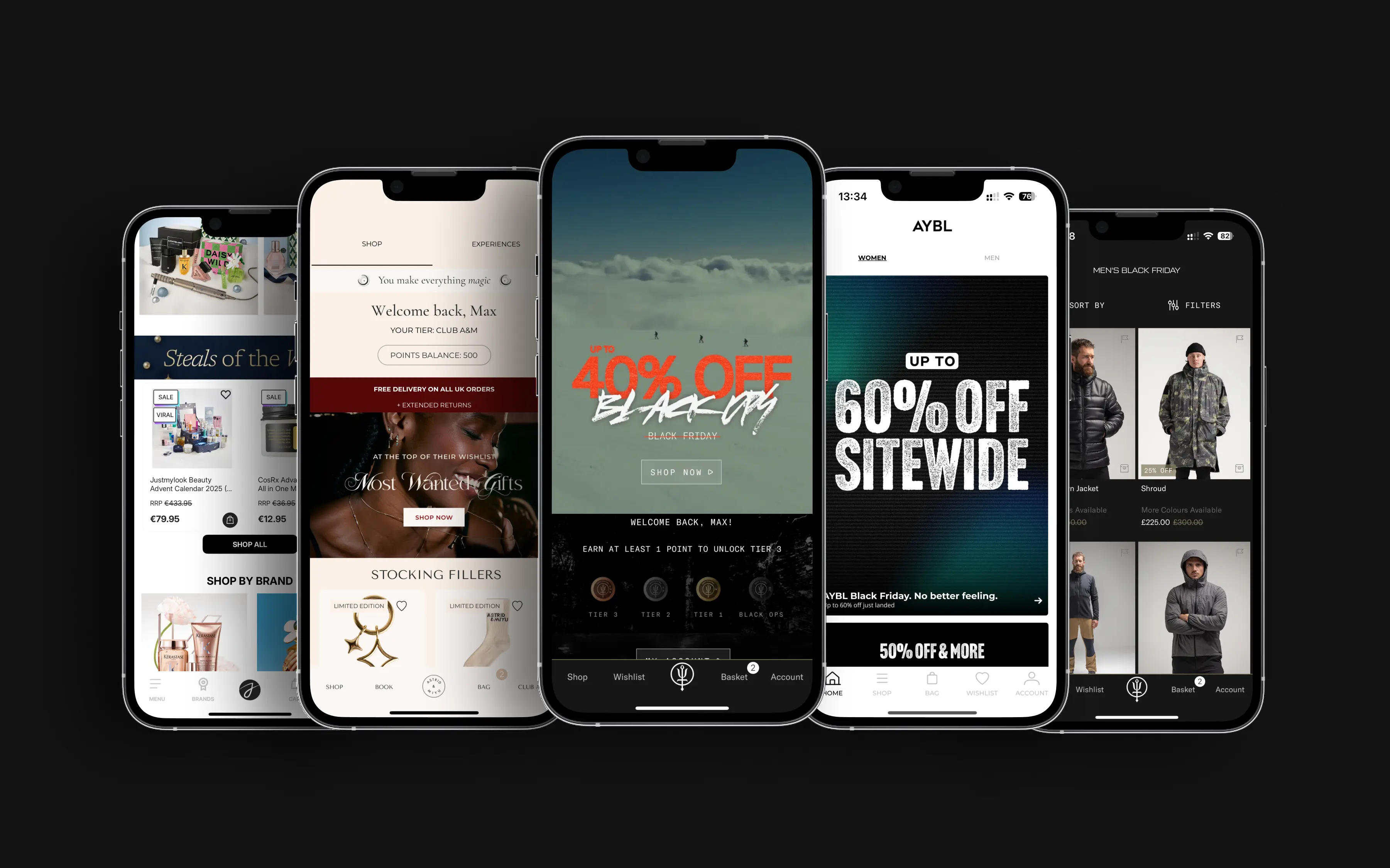
7 Tips to Win Black Friday Cyber Monday (BFCM) with Mobile Apps
10 min read
author:
Max Hatter
publish date:
11th November 2025
Strategy Spotlight
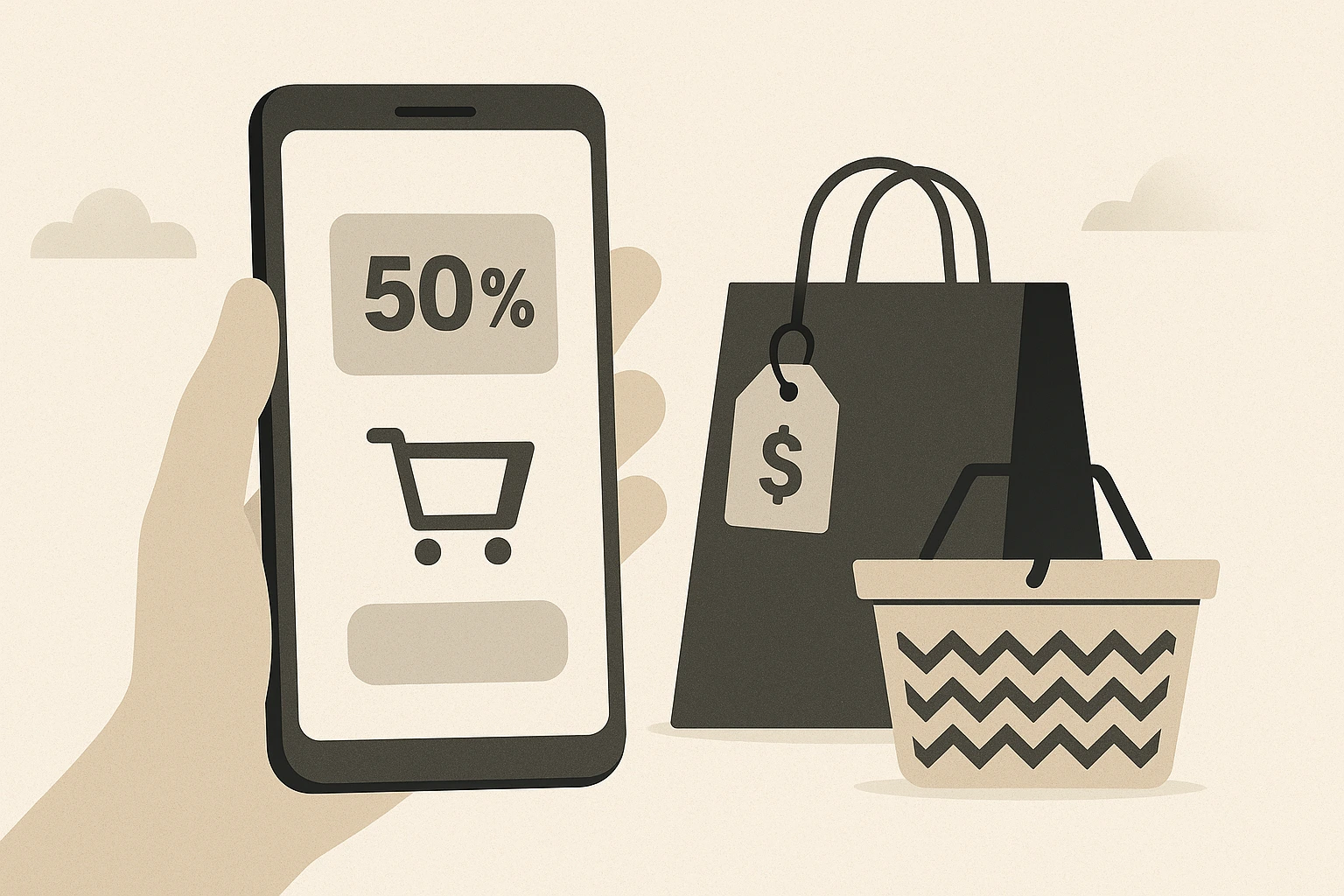
BFCM In Review: Venn Apps Drive $56m in Revenue
5 min read
author:
Max Hatter
publish date:
12th December 2025
Industry Insights

7 Tips to Win Black Friday Cyber Monday (BFCM) with Mobile Apps
10 min read
author:
Max Hatter
publish date:
11th November 2025
Strategy Spotlight

33 Customer Retention Statistics Every eCommerce Brand Should Know (2025)
10 min read
author:
Max Hatter
publish date:
11th November 2025
Industry Insights

9 Strategies to Increase Customer Lifetime Value (CLV) in eCommerce
15 min read
author:
Josh Gare
publish date:
11th April 2025
Strategy Spotlight

12 Best eCommerce Mobile App Development Companies
10 min read
author:
Max Hatter
publish date:
11th November 2025
App Development
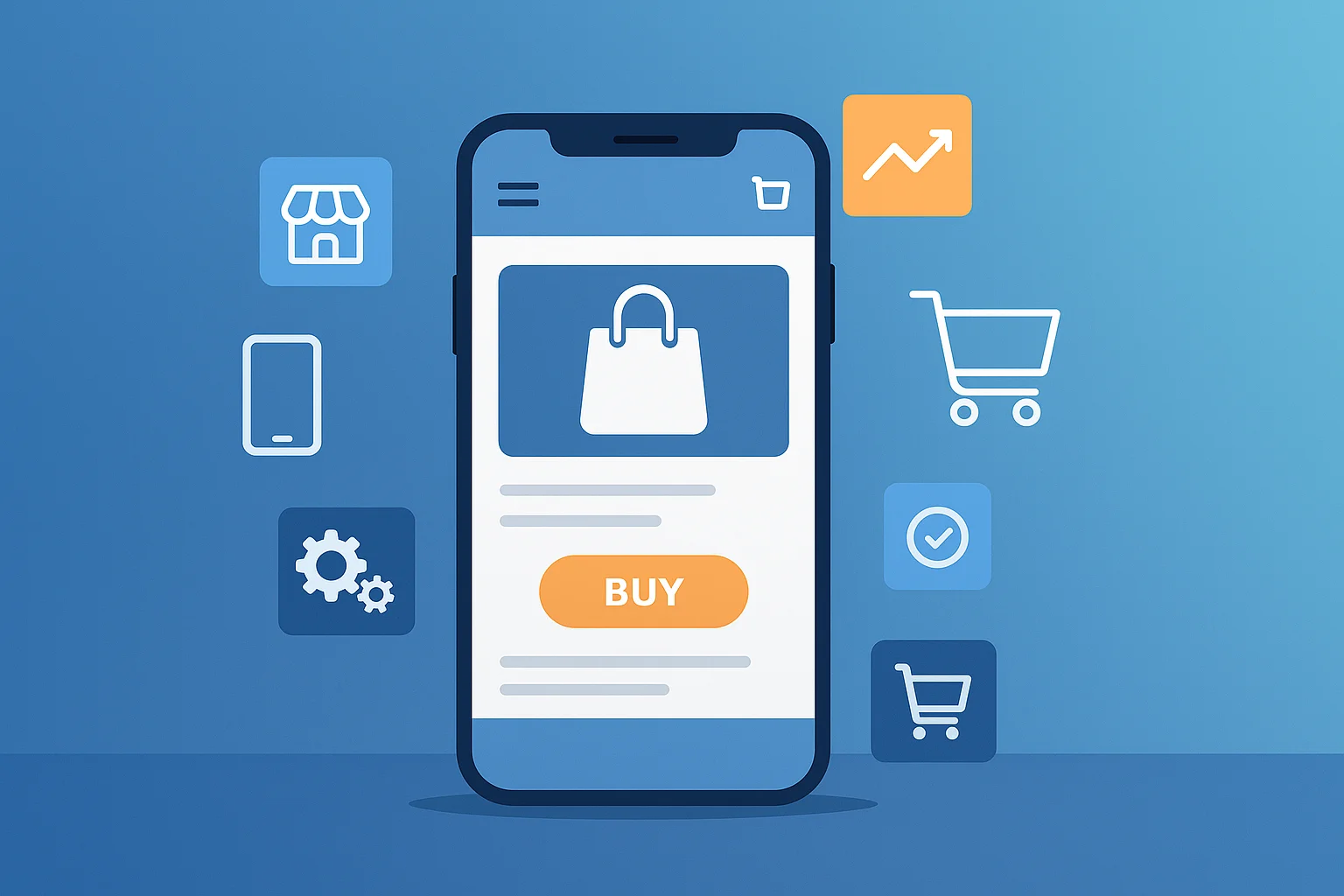
Going Omnichannel: How Leading Shopify Brands Are Bridging Online and In-Store with Mobile Apps
10 min read
author:
Max Hatter
publish date:
28th October 2025
Industry Insights

Must-Know Mobile App Download and Usage Statistics in 2025
10 min read
author:
Max Hatter
publish date:
10th October 2025
Industry Insights
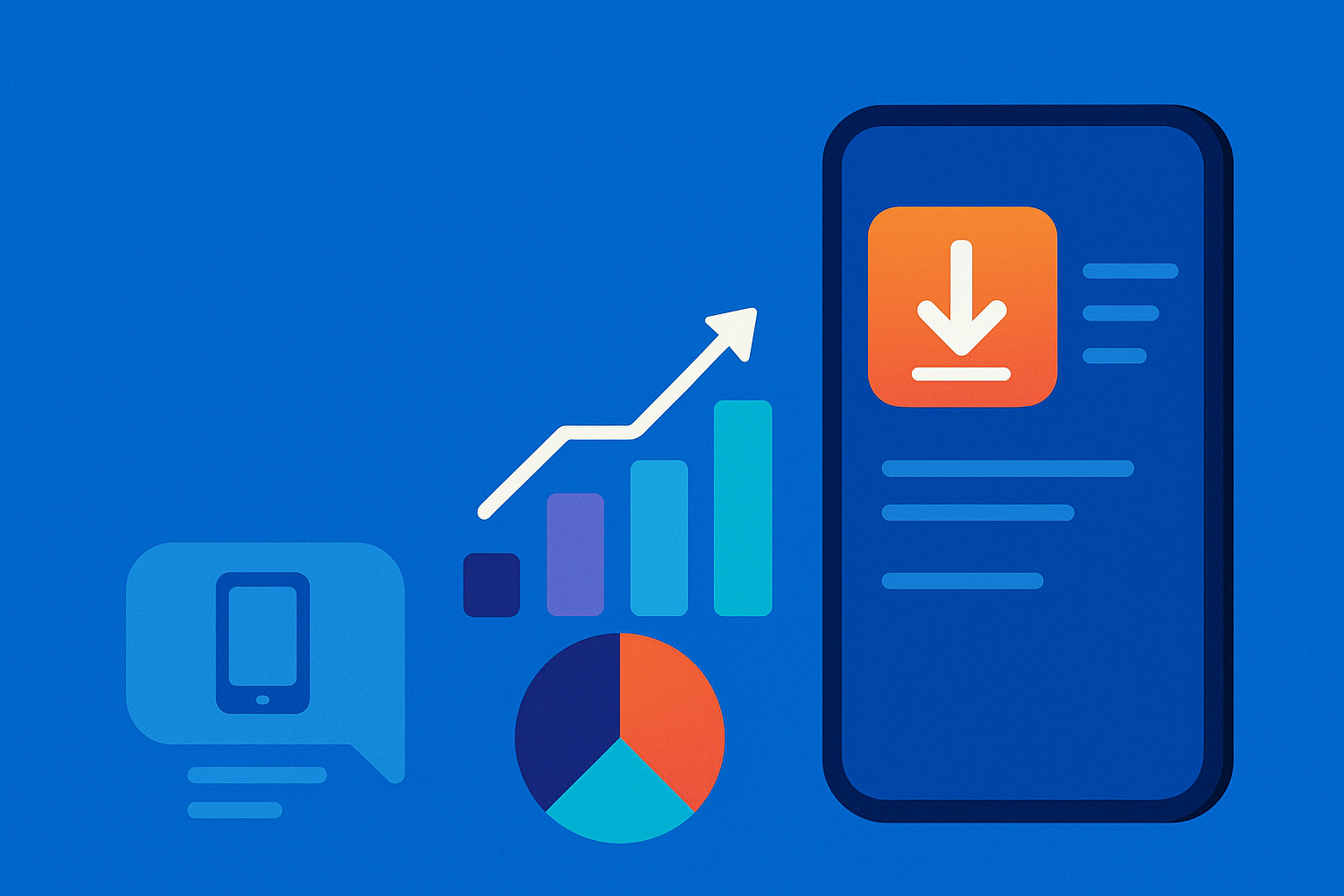
Introducing Geo-Located Push Notifications
5 min read
author:
Max Hatter
publish date:
7th October 2025
Product News

Product Updates H1 '25: More Control, Better Insights, Greater Flexibility
10 min read
author:
Max Hatter
publish date:
24th July 2025
Product News
.png)
8 Best Shopify Mobile App Builders in 2025
10 min read
author:
Josh Gare
publish date:
7th February 2025
App Development
.png)
Push Notifications vs Email: Which Drives More Engagement?
10 min read
author:
Max Hatter
publish date:
20th June 2025
Digital Marketing

Shopify Mobile App Development Services: Best Options for 2025
10 min read
author:
Max Hatter
publish date:
5th June 2025
App Development

How To Build An eCommerce App: Complete Guide (2025)
15 Min Read
author:
Max Hatter
publish date:
30th May 2025
App Development

35 Essential Stats on Mobile Commerce in 2025
10 Min Read
author:
Max Hatter
publish date:
16th May 2025
Industry Insights

9 Best ECommerce Mobile App Builders (2025)
10 min read
author:
Max Hatter
publish date:
5th September 2025
App Development

How to Optimize Your Shopify Store for Mobile: The Ultimate Guide
10 min read
author:
Josh Gare
publish date:
16th April 2025
Industry Insights

Guide to Push Notifications for a Shopify Mobile App
5 min read
author:
Josh Gare
publish date:
28th March 2025
Digital Marketing

12 Best Shopify Apps for Clothing & Fashion Stores (2025)
10 Min Read
author:
Josh Gare
publish date:
19th March 2025
Industry Insights

How to turn your Shopify Store into a Native Mobile App (2025)
10 min read
author:
Josh Gare
publish date:
17th March 2025
App Development

9 Essential E-Commerce Growth Strategies for 2025
15 min read
author:
Josh Gare
publish date:
14th March 2025
Industry Insights

Should Shopify Brands Develop Mobile Apps In-House?
15 min read
author:
Josh Gare
publish date:
7th March 2025
App Development

8 Successful Shopify Brands with a Mobile App
10 min read
author:
Josh Gare
publish date:
28th February 2025
Industry Insights
.png)
The Ultimate Guide to Push Notifications for E-Commerce
10 min read
author:
Josh Gare
publish date:
14th February 2025
Digital Marketing
.png)
Shopify Summer Editions: 5 Things We’re Most Excited About
10 Min Read
author:
Max Hatter
publish date:
2nd June 2025
Industry Insights

The 5 Best Tapcart Alternatives To Build A Shopify Mobile App
10 min read
author:
Max Hatter
publish date:
1st July 2025
App Development
.webp)
10 tips to increase app downloads and user activity for Shopify merchants
5 min read
author:
Josh Gare
publish date:
18th November 2024
Digital Marketing

Delivering Omnichannel Loyalty with Mobile Wallet Passes
10 min read
author:
Max Hatter
publish date:
6th May 2025
Product News

WANT TO LEARN MORE ABOUT MOBILE APPS?


